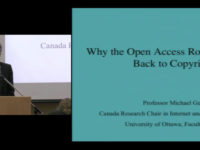On the same day that I wrote about the overwhelming volume of hearings, notices, and consultations on digital policy, I also appeared before the House of Commons Standing Committee on International Trade to discuss the role of government policy in fostering the growth of e-commerce. The panel included eBay Canada’s Andrea Stairs (who argued for an increase in the de minimis threshold for consumer imports) and Peter Simons, the CEO of the Simons department store chain (who argued for no de minimis and the application of sales taxes on all purchases regardless of the size or location of the seller). My opening remarks centered on five areas for government action on e-commerce: access to affordable broadband, fostering consumer trust, intermediary liability, intellectual property, and e-commerce in trade agreements.
News
Canadian Copyright, OA, and OER: Why the Open Access Road Still Leads Back to Copyright
It is open access week and this year I had the honour of delivering the keynote address at a terrific open access event co-sponsored by the Ryerson University Library and Archives and the University of Toronto Libraries. My talk – which can be viewed in full here or from the embed below – starts with a review of the remarkable success of open access over the past 15 years, but quickly shifts toward the continuing connection between balanced copyright and open access.
NAFTA Modernization and IP/E-commerce: My Appearance at the Senate Open Caucus
I appeared earlier this week before the Senate Open Caucus to discuss the IP and e-commerce implications of the NAFTA renegotiation. The panel, which included Jerry Dias, Al Mussel, and Brenda Swick, featured an engaging discussion with senators from across the political spectrum. My opening remarks emphasized three points from a Canadian perspective: meeting international standards, doing no harm, and seeking a level playing field. The comments are posted below.
Government Rejects Call for an Internet Tax: “Conflicts With Principle of Affordable Access”
The federal government yesterday released its response to the Standing Committee on Canadian Heritage report on local media released last June. The most controversial recommendation in that report – one swiftly rejected by Prime Minister Trudeau – was a call for a new Internet tax to help fund Canadian media and the creation of Cancon. As I wrote at the time, the proposal is a terrible idea that runs counter to important policy objectives of fostering affordable network access for all Canadians.
The government response, signed by Ministers Joly, Bains, and Morneau, rightly notes that “access to affordable broadband Internet, particularly in rural and remote regions, is essential to the participation of the Canadians in the digital economy.” In light of this policy priority, the government firmly rejects the Internet tax proposal, grounding its decision in the principle of affordable access:
The Case for CASL: My Appearance Before the Standing Committee on Industry, Science and Technology
The Standing Committee on Industry, Science and Technology is conducting a review of CASL, Canada’s anti-spam law. While the usual critics are out in full force, I had the opportunity to appear before the committee yesterday to explain why there is real harm, why CASL has helped solve the problem, and why claims that the law is overbroad are overstated. Of particular note was the discussion involving the significant decline in the number of major spamming organizations operating in Canada since the law took effect. Three years ago, Spamhaus’ Register of Known Spamming Organizations listed Canada as home to 7 of the top 100 spamming organizations worldwide (who are responsible for 80% of global spam). Canada’s presence on the ROKSO list has been dramatically reduced with only two Canadian-based organizations remaining on the list, suggesting that spam originating in Canada has experienced a significant decline. My full opening remarks are posted below.


![By Office of the President of the United States (@realDonaldTrump on Twitter) [Public domain], via Wikimedia Commons https://commons.wikimedia.org/wiki/File%3ADonald_Trump_Justin_Trudeau_2017-02-13_03.jpg](https://www.michaelgeist.ca/wp-content/uploads/2017/10/Donald_Trump_Justin_Trudeau_2017-02-13_03-200x150.jpg)








